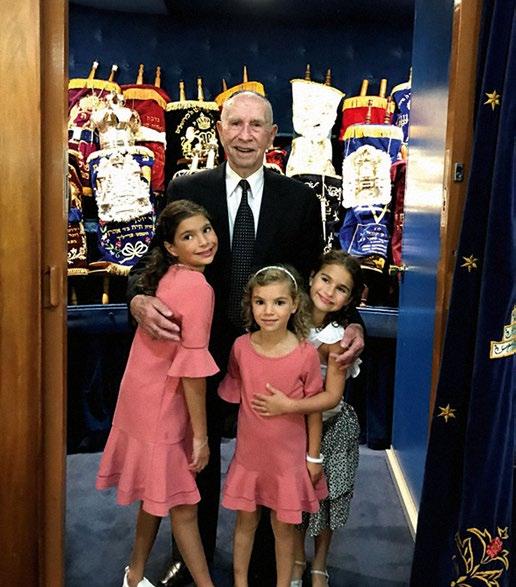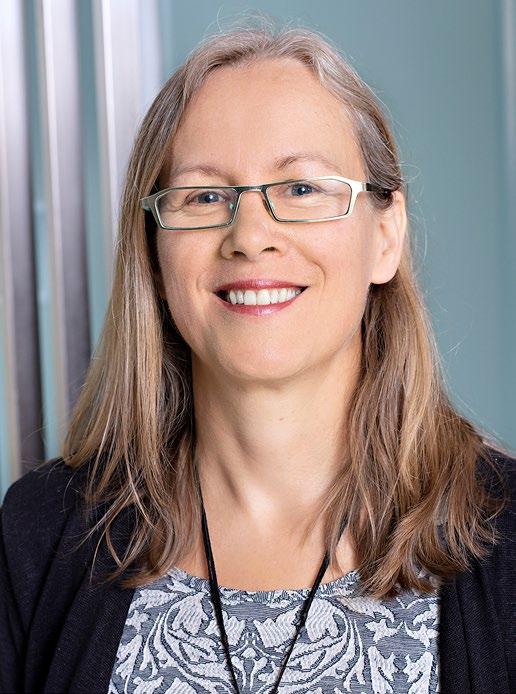
5 minute read
Celebrating 80 years later
Ian and Henry Sharp
Miriam and Zvi Sharp
Advertisement
Zvi Sharp has fond memories of a simple, happy childhood, shared with his four brothers, Mayer, Mendel, Leibel and Gershon, friends and neighbours in the close-knit town of Ryki in 1930s Poland. He grew up in an Orthodox Jewish home, went to cheder, and has precious memories of Shabbat meals with his family.
Everything changed in September 1939, when Ryki was captured by German troops and the Jews were forced to build their own ghetto. Around 10 members of his extended family, including Zvi, Gershon and their parents, were crammed into his uncle David’s small house. Then, in May 1942, all the Jews were ordered to the town square, told to leave their clothing and belongings, and were forced to walk 12 kilometres to Deblin Station, and then to the Deblin Concentration Camp.
Families were separated and people were hysterical. Zvi lost sight of his parents and younger brother. He never saw them or his older brothers again. He was 15 years old. Between May 1942 and early 1944, he was at Deblin, Colditz, and Buchenwald Concentration Camps. He stayed strong, surviving hard labour and shocking conditions. In early 1945, in the depths of winter, he and his fellow inmates were forced on a death march to Theresienstadt, where they were liberated by the Russians.
His nightmare was finally over, but he was all alone and adrift. Returning to Lublin, he met others going to a makeshift kibbutz in preparation for going to Palestine (now Israel) and decided to join them. They made their way across Europe to Marseille to make the illegal voyage to Israel, only to be interned in Cyprus by the British when they arrived. A year later, he was able to reach Eretz Yisrael, finding work as a carpenter in Haifa. Soon after the declaration of the State of Israel in 1948, he joined the army where he remained for two years. In 1950, Zvi met Miriam Bercovici and they married soon after. They were blessed with two sons, Ian and Henry, but Zvi constantly searched for any surviving members of his family. Although everyone in his immediate family had been murdered, he had an uncle and cousins in Australia who urged the family to come. The yearning for family and the possibility for better opportunities made them decide to migrate, and they arrived in Melbourne in 1961.
Zvi and Miriam had to work hard to provide for their family, but they built a new life. Zvi was grateful for their healthy, comfortable, and safe life and, more than anything else, the joy of their children, grandchildren and great-grandchildren – something that in 1945 he could only dream of.
At the age of 93, at the suggestion of his daughter-in-law Ruth, Zvi agreed to have the bar mitzvah he was unable to have at the age of 13. He saw it as a chance not only to celebrate his lost opportunity, but also to honour of the multitudes of young Jewish boys whose lives were brutally extinguished.
Zvi decided to make a donation to the Jewish Holocaust Centre (JHC) in lieu of gifts. We thank him for his generous donation and wish him Mazal tov.

Zvi Sharp with his great-grandchildren (l-r) Zahara, Ariella and Mayah Sharp
Virtual workshops:
pivoting towards a future beyond borders
Tracey Collie
The Jewish Holocaust Centre (JHC) mission to keep the voices of the Holocaust alive through education continued in 2020, despite the constraints COVID-19 threw at us. From August to December, our virtual workshops reached approximately 3,000 students from some 45 different schools across three different Australian states.
In each workshop, students gained an understanding of concepts such as race and propaganda, and how these contributed to the Holocaust. They then journeyed through each phase of the Holocaust before hearing the moving stories of a Holocaust survivor. All workshops concluded with a powerful reflection, asking students to carry the lessons of the Holocaust into their lives today and to become the voice of survivors by continuing to tell their story.

Student feedback
• 4.6 out of 5 rating overall • 98% of students said the workshop enriched their understanding of the Holocaust • 93% of students agreed they were inspired to learn more about the Holocaust.
Importantly, each workshop considered the way students were learning about the Holocaust within their classroom, allowing for a more focused and individualised approach for each school. Combined with our other virtual offerings, Ask a Survivor, Understanding through Testimony and updated film and literature recommendations delivered via our Teacher eNews, teachers were well supported to continue to deliver a comprehensive Holocaust unit in their virtual classrooms.
This year presented early challenges and we found ourselves drawing on the important lessons of 2020 – to be flexible and keep adapting.
With the museum put away in storage for the time being, facsimiles of approximately 32 artefacts from our collection have been created for students to handle and explore when they attend the new In Touch with Memory program. Following professional development sessions with Paul Salmons, independent curator and educational consultant in the UK, the JHC education team thoughtfully curated an updated virtual workshop combining the best parts of the last year’s workshop and the handling collection from In Touch with Memory. The team plans to continue to evaluate and improve the workshop to ensure that it remains a staple in our suite of programs.
We excitedly began welcoming students back on-site in February 2021, albeit in smaller groups due to Covid-safe restrictions. The feedback to the new program has been excellent and we hope restrictions ease soon to allow more students through our doors.
With the government mandate of compulsory Holocaust education for all Victorian Year 9 and 10 students beginning this year, the virtual workshops will also provide a unique opportunity to achieve our strategic priority to develop our reach to every Victorian school student. Our reach, beyond the invisible border of metropolitan Victoria, will grow further and allow students in regional Victoria, unable to attend in person in the past, finally experience and learn our powerful message. The opportunities our virtual workshop has opened up are endless and we will continue to explore these this year.
So, what did 2020 teach us? Be flexible, embrace the opportunities and the voices of our survivors will continue to educate students on the powerful lessons of the Holocaust.

Abram Goldberg OAM Paul Grinwald (top row centre) with students and JHC educators
Tracey Collie is JHC Education Programs Officer.










